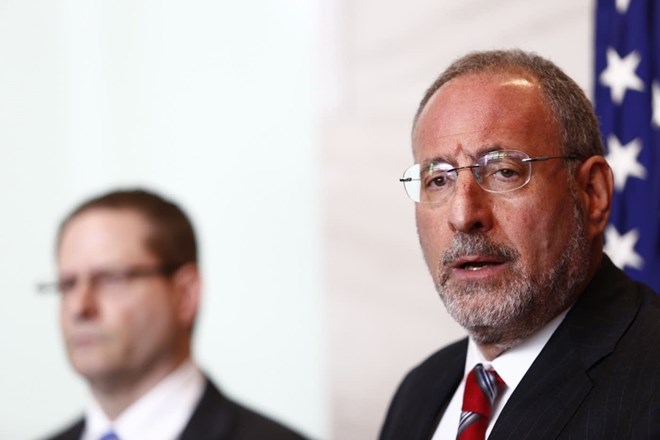
Wednesday June 22, 2016
By Laura Yuen

U.S. Attorney Andy Luger, right, with the FBI's Richard Thornton at a press conference at FBI headquarters in Brooklyn Center, Minn. earlier this month. Evan Frost | MPR News
Some Twin Cities Somalis are "in denial" about the threat of terror recruitment and should work with law enforcement to fight the ongoing radicalization of their youth, U.S. Attorney for Minnesota Andy Luger said Tuesday.In his first interview since three Minneapolis men were convicted two weeks ago of trying to join ISIS extremists in Syria, Luger offered his strongest argument yet toward those who've criticized the FBI's investigation and the U.S. attorney's office prosecution.
"You've got to admit the facts," he told MPR News. "Denying terror recruiting, denying that it's happening, and that it's a crime and that it's dangerous, is not going to get us where we need to go. We all need to agree on the basic facts. This happened."Luger said he wants to prevent more Minnesotans from going to Syria to die for ISIS.
At least five young men from the state are presumed dead in the Middle East, allegedly fighting for the extremists. Nine others who were arrested and charged with plotting to join the group "are alive today, unlike their friends who made it," he added.
Luger defended his office's prosecution of the ISIS cases, the FBI's use of a paid informant, and his efforts to bring more resources to East African youth.
Luger found himself in a difficult spot after he was sworn in as U.S. attorney for Minnesota in early 2014. He built some goodwill in the Somali-American community after fighting for an attempt to build a mosque in a Minneapolis suburb. He also championed a plan to steer more money toward social services to make Somali-American youth more resilient.
Many community members, though, have remained skeptical of Luger's outreach efforts because of his role prosecuting one of the largest clusters of ISIS cases in the nation.
Some found the government's response overreaching. A jury's decision to find the three defendants guilty earlier this month on the most serious charge, conspiracy to murder abroad, means the young men face sentences of up to life in prison.
Luger said he's working hard with a group of imams and other Somali-American professionals to counter the narrative of terrorism in their community. He wants the families of the defendants to share publicly what they've told him privately — that they're grateful the federal authorities saved their sons lives.
"I had a father say to me privately, 'the FBI saved my son's life. If they hadn't stopped him at the airport, and if he hadn't gone through this case, he'd be dead,'" Luger said.
But others, Luger said, are sowing anti-government sentiments in the community.
"Unfortunately, I think there are some who want to breed distrust and play on the distrust," he said. "I would like them to work with the other community members to solve this problem, not just talk about this problem."
In recent weeks, Luger has been more outspoken about the criticism he's faced from some corners in the community. On the day the trial concluded, he referred to "people who are sometimes are referred to as 'community leaders' but who deny the existence of terror recruiting."
Although he didn't name anyone, it was clear Luger was referring to people like Sadik Warfa, a Somali-American activist who often criticized the investigation and spoke on behalf of the defendants' families.
"I'm not there to please people," Warfa said after the conclusion of the trial. "I know my rights as an American citizen, and I have to ask the questions mothers want me to ask."
Warfa said he's not in denial about terror recruitment. He just doesn't think Luger's program is truly community-led. He characterized it as "top-down."
Would a little more humility on Luger's part help solve the divisions?
"I just want to help," Luger said. "If there are ways I can help, great. If you need me to take a step back, that's great, too."
He and Rick Thornton, the special agent in charge of the FBI's Minneapolis division, said that despite the fears in the Somali community about the FBI, several families have turned to investigators for help.
In some cases, the parents were concerned after learning their sons were watching online extremist propaganda. The FBI helped get them off that path, and they were never charged, Thornton said.
"That certainly is a preferable outcome," Thornton told MPR News. "If we're able to off-ramp them, intervene, keep them from going in that direction before they violate the law, that's an absolute win."
While the nation has recently seen fewer Americans leave for the Middle East to join ISIS, the FBI is continuing to investigate the flow of fighters from Minnesota, Thornton said.
"Nationally the trend has slowed," he said. "I wouldn't necessarily draw that same conclusion here in Minnesota. There are active cases of individuals who have expressed a desire to travel and join ISIS overseas."